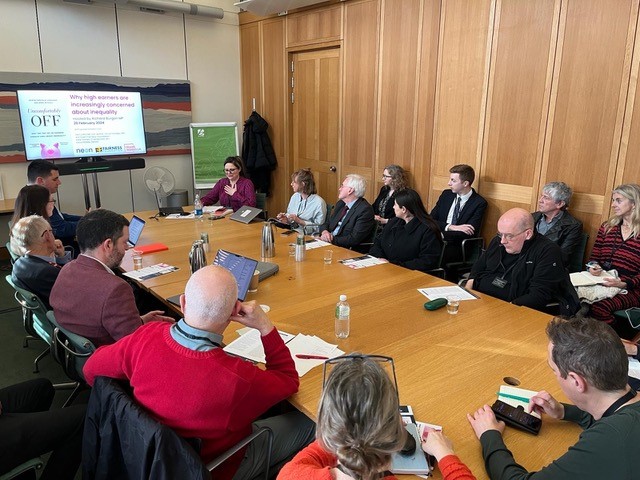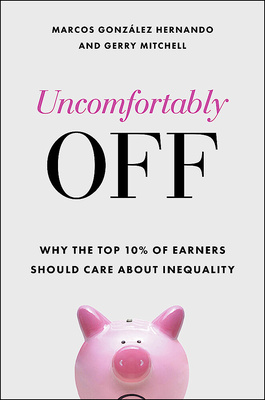Richard Burgon MP recently hosted a pre-budget briefing to discuss the most effective strategies for communicating with high earners. Presenting findings from Uncomfortably Off: Why the Top 10% of Earners Should Care about Inequality, co-written with Marcos González Hernando, I argued that they are an often overlooked but politically significant group.
They are the professionals and managers dominating our economy and politics, and are best placed to reset the public conversation about the flow of wealth in our society. However, while they often work for the very wealthiest, their interests are becoming quite different. The wealth of the top one per cent has multiplied 31 times more than everyone else since 2010, while those earning £60,000 and up (the top ten per cent) are reporting that it is increasingly difficult to make ends meet.
It is not surprising that the British public are most likely among Europeans to think that the economy is rigged for the rich and powerful, with the worst pay squeeze for 200 years, a huge increase in insecure and low-quality work, and 15 million in poverty, of which more than half are in work in the most unequal large economy in Europe. Earned income is so unequal that, of the 31 million people who do pay income tax, only 300,000 (the top one per cent on £183,000 and above) pay a third of all income tax; the remaining earners in the top ten per cent contribute another third and the 90 per cent pay the rest.
High earners can see the impacts of inequality on their lives: the lack of trust, concern at crumbling public services; the decline in the ability to buy a home. They have noticed that work is precarious and paying less, which particularly threatens their children. Will Snell, Chief Executive of the Fairness Foundation, presenting at the briefing, shared survey results that they are more aligned with the general population in their concern about inequality. 47 per cent of high-income households consider it the single or one of the most important problems facing Britain compared to 42 per cent of households as a whole. 72 per cent of the population as a whole think that ordinary people don’t get their fair share of the nation’s wealth. This figure is 70–72 per cent among the wealthy and high earners. However, the big attitudinal divide is between the top one per cent and the rest of the public. Only 55 per cent of those with more than £500k in wealth agree.
Dora Meade, Head of Messaging at NEON, an organisation that works to accelerate social movements through support and training for campaigners and organisers, pointed out that while high earners may be overrepresented politically, their difficulties and anxieties had not been. Any conversation with a high earner about inequality should legitimise how they feel and elaborate on why it is no surprise that they are not feeling wealthy. High inequality in their own income group means that even someone on £82,000 (a top five per cent earner) is, in absolute terms, closer to someone on the median than they are to someone earning a top one per cent income. With lifestyle costs increasing the higher they climb up the ladder, a one percentage point drop in income feels very costly to a high earner. This is why affluent voters on £50,000 and £60,000 continue to be misrepresented as struggling middle-income earners, even though 80 per cent of income earners earn less and get a passing mention. As such, the public conversation about inequality continues to be driven by misperception.
Most high earners know something is wrong and unsustainable, but many do not fully understand why we cannot mend our broken social contract without redistribution. Dora argued that being honest and specific about where high earners stand relative to others is crucial to inviting them to empathise with the economic realities of others and find solutions for a social and economic order in which they, the rich, feel poor.
High earners tend to be in jobs that reproduce the imbalances in our economy and politics. They are worried about the resentment of those they work for and represent, and anger against an economic order which they consider common sense. They don’t meet and interact with other income groups, a characteristic of highly unequal societies, and until they do, are likely to continue feeling distrustful and isolated. Siobhan Morris, a Structural Inequality Alliance member who attended the round-table briefing, pointed out that with fewer social and civic meeting places, where can the narrative for a new public discourse be drawn from?
Kate Stanley, Executive Director of Frameworks UK, an organisation that develops communication that creates change, advised that presenting the facts of inequality in a moral way can make some high earners defensive. As Peter Pomerantsev observes about the media’s role: ‘You can’t shove “the truth” down people’s throats if they don’t want to hear it, but you can inspire them to have the motivation to care about facts in the first place.’ Similarly, Kate warned that investing time and energy in describing the symptoms of inequality, and their negative impact on us all, risked perpetuating the perception that social and economic inequality is too big to solve, which could lead to fatalism and a lack of will to tackle it. On the other hand, collaborating with high earners as leaders of institutions, to explain and address the specific structural mechanisms of inequality in their own organisations, would be empowering and could develop into wider awareness of underlying structural inequality.

At the discussion, it was agreed that politicians and campaigners begin by understanding the world of high earners, emotionally making the connection that it is in their interests to reduce inequality. This will make it much more likely that they become their own effective advocates in building a public conversation that ‘better government and better public services is a route to the good life’. As The Social Guarantee explains, state investment in many services currently taking a big share of people’s income (energy, water, transport, broadband, childcare and housing) could save high earners money. Failing to invest in public goods and services, just papering over the cracks, may mean paying more in the long term for worse ones. The UK’s soaring bill on housing benefits is a good example.
The top ten per cent will need good public services at various points over their lifetimes. They will benefit directly and indirectly from education that provides opportunities, from work that pays well and from health and social care in old age. Reducing inequality will lessen spillover effects – particularly on their health. Inviting them to continue what they most value, what will make their lives better, is perhaps the most important of all as ‘many of these values and aspirations are things that the state plays a central role in providing’.
If our economy is not working for the most privileged in our society, then this is a sign that the wider system of reward is not working for anyone. The harsh reality is that ‘petty and irrelevant’ fiscal fictions were the focus of this week’s budget, while wealth taxes and other obvious solutions for funding the size and shape of a state that would meet our growing social needs remain unspoken and taboo. Innovative economic ideas – take Raworth and Mazzucato – on how we leave a broken, stagnant economic order behind and adapt, innovate and thrive to meet our future social and climate needs are nowhere to be seen. In these circumstances, who better than high earners to reset the discussion about why wealth flowing out of the middle of the income distribution, out of government and towards the very top of our society, matters for us all?
Gerry Mitchell is a freelance policy researcher, working most recently for the Think-tank for Action on Social Change (Dublin), Friedrich-Ebert-Stiftung (Stockholm and London) and the Foundation for European Progressive Studies (Brussels).
Uncomfortably Off by Marcos González Hernando and Gerry Mitchell is available on the Bristol University Press website. Order here for £19.99.
Bristol University Press/Policy Press newsletter subscribers receive a 25% discount – sign up here.
Follow Transforming Society so we can let you know when new articles publish.
The views and opinions expressed on this blog site are solely those of the original blog post authors and other contributors. These views and opinions do not necessarily represent those of the Policy Press and/or any/all contributors to this site.
Image Mika Baumeister via Unsplash



